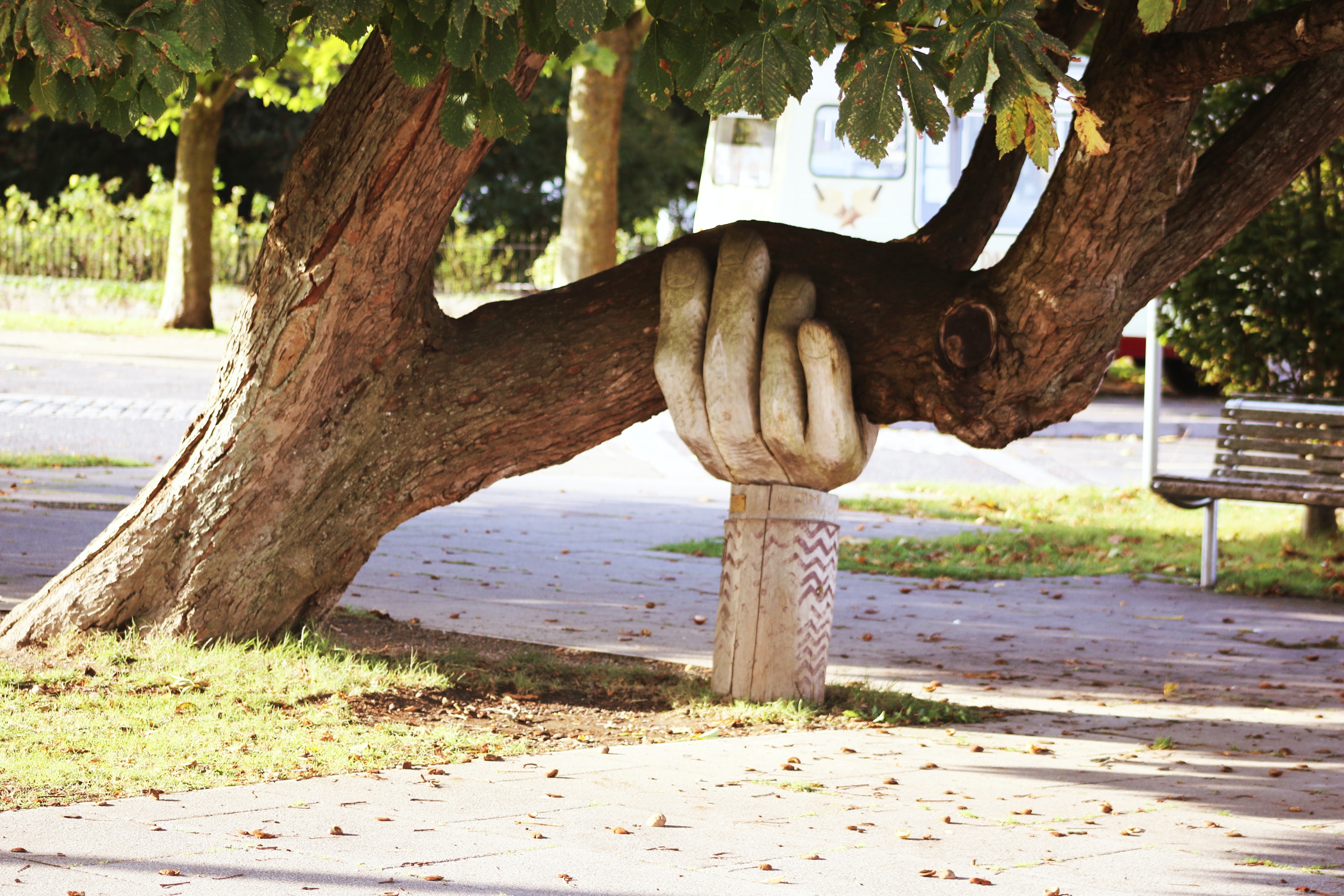In the first of a series of blogposts to mark the first anniversary of the LSE Higher Education Blog, we turn our gaze inwards – to the LSE community. It’s been almost two months since LSE has been locked down. The LSE HE Blog team speaks to LSE staff, students, and alumni to find out how the community is working, studying, and teaching at a distance
MARRAL SHAMSHIRI-FARD
PhD Candidate, LSE Department of International History, GTA; SSLC Representative; EDI Representative; Decolonising LSE member
Currently located in London
LAURA DAWSON
Director, LSE Data and Technology Services; Trustee, Charity IT Leaders

Which part of your day do you most look forward to?
First thing in the morning, sitting with my husband, coffee in hand, spending an hour bird-watching, reading the paper, and checking the diary for the work day ahead.
What have you found challenging during lockdown?
Seeing myself on video calls all the time. Seriously though, being on back to-back video calls means by the end of the day I am as stiff as a board. But connecting to people and the loss of serendipity is also a big loss.
How do you keep in touch with the LSE community?
Regular check-ins with the team – Teams chat and Yammer for contact with everyone in LSE (bit lonely there though); Twitter, LinkedIn and The Independent for wider connections.
What do you miss most about being on campus?
Students… it’s why we are there, my team, and being in awe of some of our super smart academics and teaching staff …. not all though – some I don’t miss at all.
Would you like to share some words of advice or your personal mantra that gets you through lockdown?
Move about, take a moment to enjoy nature (I may have spent a small fortune on bird food), get a routine, be bold but be kind.
SECKIN SERTDEMIR OZDEMIR
Research Officer and Visiting fellow, LSE European Institute
Currently located in Surbiton, London
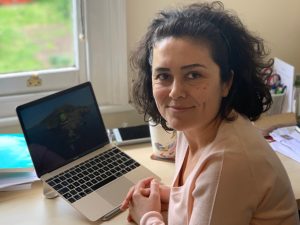
Which part of your day do you most look forward to?
I look forward to drinking my first coffee at 11:00 each day!
What have you found challenging during lockdown?
It is very challenging for me to keep working and writing while homeschooling my daughter.
How do you keep in touch with the LSE community?
I have been trying to attend online workshops and conferences organised at LSE. Also, I am looking forward to participating in Shut up and write sessions organised by LSE Eden Centre every week.
What do you miss most about being on campus?
Taking a coffee with my friends and colleagues.
Would you like to share some words of advice or your personal mantra that gets you through lockdown?
I am sure there have been many ways to get through hard times; but for me, expressive writing helps to reduce my stress and anxiety. To keep working on my research project, I am using the pomodoro technique. While I am used to working from home, having done it for many years, this time, I have to work while educating my daughter at home. Thus, I created a new daily routine for myself and my daughter.
FRANK TURNER
Singer-songwriter
BA, Modern History, LSE, 2004

Which part of your week do you most look forward to?
I’ve got into the rhythm of doing a livestream show every Thursday evening. They’re benefit shows for independent music venues around the UK, and we’ve been raising £10k or more a week for different places that are desperately in need of help. Having that routine is really helpful, it gives both, me and my audience, something to look forward to; plus I’m playing a completely different set each week, so there’s always songs to practice. And it feels good to use my time and my platform for something positive.
What have you found challenging during lockdown?
The most obviously challenging thing is that the industry in which I work has basically ceased to exist, and there’s no telling how, if or when it will get back on its feet. Live music is likely to be one of the last parts of the lockdown to be eased, and the infrastructure of the industry is taking a serious beating in the meantime. It’s scary and depressing.
Are you in touch with the LSE community?
Not really. I recall that my tutor at the LSE, Professor Anita Prazmowska., wanted me to go on to study a Master’s with the school. But by then I was beginning to have success in the music industry, so I continued down that path instead. I have seen her since, which was great.
Do you miss being on campus?
It’s been a while – 16 years – since I was on campus. I remember playing some live gigs in the basement in the SU with my band at the time, Million Dead. Thinking about it, the Central and Eastern European history I studied at that time has found its way into my lyrics. It goes to show how your education never stops being an influence in your life.
Would you like to share some words of advice or your personal mantra that gets you through lockdown?
I guess the main thing I’ve found helpful is being forgiving of myself for having unproductive days. At the start, I got really stressed if I had a day where I didn’t feel productive, and beat myself up about it. That’s nuts; this is a global pandemic, and unprecedented disaster, and everyone is allowed some time to feel confused and despondent about it. So don’t be too harsh on yourself.
KEVIN WILSON
Academic Liaison and Collection Development Manager, LSE Library
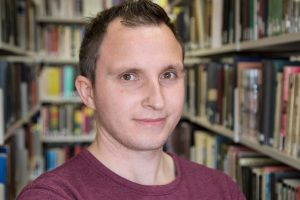
Which part of your week do you most look forward to?
Tuesdays – our team meets every other week and it’s a chance to catch up, to see how we’re all doing and share what we’re working on. Every day is different, but the one constant is that we’re supporting our students and staff as much as possible during this time.
What have you found challenging during lockdown?
The Library is one of the largest service divisions with a high number of staff. Most days, you’d see a lot of colleagues you don’t immediately work with, have chats in the staff room whilst the kettle boils, etc. We have a Teams group called ‘The Coffee Lounge’ to try to replicate that, but there are still many colleagues you won’t have seen or heard from throughout the lockdown.
How do you keep in touch with the LSE community?
Thanks to the Eden Centre’s support and their short learning curves, we’ve been using Teams and Zoom to work collaboratively, both within the Library and in cross-divisional groups I’m part of. This has worked really well. My team, the Academic Support Librarians, are in regular contact with departments to keep them informed about improvements to our collections and support during this time.
What do you miss most about being on campus?
The Library being closed and our physical collections and spaces being unavailable to users. We know how hard that has been. But we’ve invested in making as many collections available online as possible and we’re still supporting our students and staff via email and virtual chats. As the weather has been nice, not being around to enjoy the spring sunshine in Lincoln’s Inn Fields at lunchtimes has been tough.
Would you like to share some words of advice or your personal mantra that gets you through lockdown?
I don’t have a mantra I’m afraid! However, I think it’s important to remember these are unexpected, unprecedented times and we can’t necessarily deliver our service exactly the way we’d want to. But it’s important to support students and staff as best we can, to mitigate against what we can’t do, and try to pivot aspects of the lockdown to our advantage. For example, it’s really pushed us towards more online teaching. So when the lockdown is over and we offer more of a hybrid Library service, we’ve done that hard work already.
MARINA FRANCHI
LSE100 teacher and researcher

Which part of your day/week do you most look forward to?
I am in my ninth week working from home and days and weeks are feeling very different now. I feel quite energetic on Mondays – they seem like a new beginning where all those plans I had will finally be completed and I will write something amazing, and read all those inspiring articles, and take very good care of myself, and improve my French … And then I am very grateful for Fridays because I can finally make peace with the fact that, again, it didn’t quite go to plan: my French is still very basic and the `to read’ folder is still quite full!
What have you found challenging during lockdown?
I guess I have found it difficult to move away from the silly habit of making unachievable plans … and focus. For a while I thought I would finally catch up on all the articles and read all those novels and then I felt very annoyed when I realised I could not focus. But I was not alone; friends and colleagues shared their frustration in not being able to absorb a single page. And for them too it was difficult to stare at curated pictures of piles of books on social media and not feel guilty. But these are extraordinary times, and it is ok to feel too unsettled to sit and read. We are juggling a lot in an unprecedented scenario. We are working while trying to make sense of what is happening around us, caring for those we love, for those in need in our communities. As educators we then feel the duty to support and give space to our students, while adjusting to a new way of communicating with them. It is perfectly ok if we don’t have the mental space to finish War and Peace (again!)
How do you keep in touch with the LSE community?
We started working from home on Week 9 of Lent Term. The LSE100 director and deputy directors did an amazing job of transferring our community online. The transition to online teaching was made easier by the incredibly supportive LSE100 teaching and admin team. Jessica, the LSE100 director, was very clear in communicating each step of the transition and the entire team felt very safe. Jillian, one of the deputy directors, educated us about using Zoom for teaching. We also used the platform for our Monday refreshers meetings, and for a weekly tea break together. Those were very important moments to check on each other, and to remind us that we are part of a community. On Zoom, we also had an end of term social event: Chris, another deputy director, organised an amazing online pub quiz! We were in awe: he is an online quiz master pro. It was incredibly funny! And a wonderful way to end a very unusual teaching term.
What do you miss most about being on campus?
Spring is the best time of the year in London. If the weather is nice, it is wonderful to have lunch in Lincoln’s Inn Fields or go there for a walk in search of inspiration and end up meeting a colleague who had the same idea. As much as I am grateful for the fact that I have access to an internet connection and a computer, online video chats can be very exhausting. Meetings are scheduled, and every interaction is planned. I miss randomly meeting people on campus while on my way to buy lunch. I miss commenting on the weather while waiting for the elevator in 20 Kingsway with colleagues from LSE Eden Centre. I miss meeting my former students in the library, in cafes… and I really hope that everyone is well and safe.
Would you like to share some words of advice or your personal mantra that gets you through lockdown?
I find it difficult to share words of advice now. But I can share what has given me food for thoughts on how to approach what we are going through. Firstly, Claire Hemmings’ blog post published on LSE Engenderings blog: she took me on an unexpected journey and repositioned the lens I was using to read these times. It was a very welcome intellectual and emotional jolt. Secondly, a vignette that I go to when in need of a reminder about self-care.

DMITRII PETRUKHIN
Student, BSc Accounting and Finance, Second Year; Communications Officer, LSE Student Hall Committee at urbanest
Currently located at urbanest Westminster Bridge, London
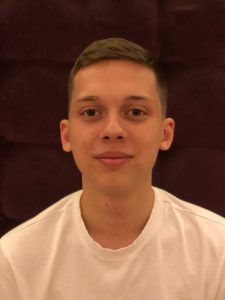
What have you found challenging during lockdown?
The COVID-19 lockdown is an unprecedented and tough experience for everyone in the world. There were several aspects of the lockdown that I have found challenging. Firstly, due to the various travel restrictions implemented in many countries, I stayed in London; my mom got stuck in Russia as she was visiting family members; and my dad is in India. Naturally, it is slightly challenging to be alone in London when your parents are in different countries. However, I frequently talk to them via Facetime as this helps us to keep in touch during the pandemic. The chats we have help us to stay positive and make the lockdown less stressful. Secondly, due to the restrictions implemented by the government, overnight my ‘normal’ routine got disrupted dramatically. I cannot go see friends or go to classes on campus. Moreover, gyms were closed, and this has negatively affected my physical and mental health. However, I ordered a kettlebell for home workouts anticipating the lockdown in the UK. This, along with various home workout videos, have helped me stay healthy during these challenging times. So, even though I have encountered various challenges, due to modern technology, I have been able adapt to the ‘new normal’ of the lockdown.
How do you keep in touch with the LSE community?
Lockdown meant I was in a situation where I wasn’t able to go to campus and most of my LSE friends were in other countries or on lockdown in other places in the UK. However, I still keep in touch with my friends form LSE via WhatsApp or Facetime. The frequent chats help not only to see how they are doing but also bring a sense of ‘normal’ during these unusual times. Furthermore, we often play Monopoly online and other online board games which is a fun way to keep in touch with my friends. Also, classes held on Zoom are a good way to stay connected with the LSE community. For example, our AC200 classes tend to be very interactive and during the classes we work in groups and discuss the problem sets with the tutors. This, in turn, helps me not only to learn the concepts, but also to keep in touch with my classmates and tutors.
Would you like to share some words of advice or your personal mantra that gets you through lockdown?
Being on lockdown can be extremely challenging, however it is extremely important to remember that this is only a temporary measure and you are not alone! I found several ways to cope with the lockdown. Firstly, I found it helpful to stay busy. Given the upcoming exams, I try to focus on revision for those exams. This helps me to concentrate on a short-term goal and spend my free time (most of the day!) productively. Secondly, I firmly believe that regularly chatting with family and friends can help you go through the lockdown easier. Lastly, quarantine can be incredibly challenging due to boredom, so it may be good to use the free time for your hobbies. I like reading books in the evenings or playing some Fifa online with my friends. You can search for an interesting reading list from your favourite author and go through the books. Or, perhaps, watch all the Oscar best picture winners during the lockdown! There are several sites with great ideas of what you can do during lockdown.
MEGHA KRISHNAKUMAR
Undergraduate Student Adviser, LSE Department of Law
Currently located in my living room looking out on the view below
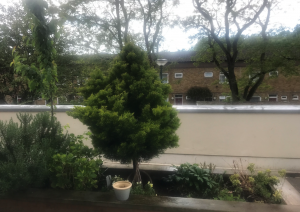
Which part of your day do you most look forward to?
I most look forward to my walk outside each day. I’ve managed to establish a few routes and love to listen to a podcast or audiobook as I walk.
What have you found challenging during lockdown?
I’ve found it challenging to not be able to see the people I care about and have a hug and tasty dinner with them!
How do you keep in touch with the LSE community?
I’ve been keeping in touch with my colleagues through emails and Zoom calls. I’ve had some really lovely virtual lunches and coffees over Zoom, which has been a great way to catch up.
What do you miss most about being on campus?
I miss being able to see my colleagues during the working day and seeing and chatting to the students around campus.
Would you like to share some words of advice or your personal mantra that gets you through lockdown?
I’ve been trying not to spend too long on any one task in the day – variety makes the time pass quickly! I’m also trying not to be too self-critical if I’m not as productive as I’d hoped at the start of the day.
FRANCISCO `PANCHO’ LARA JR.
Senior Peace and Conflict Adviser, Asia, International Alert; Professor University of the Philippines – Diliman
MSc Development Studies, 1997, LSE; PhD International Development, 2011, LSE
Currently located in Manila, Philippines
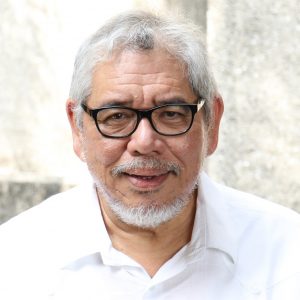
Which part of your week do you most look forward to?
I made up my mind to finish all of the writing backlogs I had during the quarantine period, and to consult with colleagues on the papers I’m writing. Hence, I look forward mostly to the 10am-12noon Zoom or FB Messenger meetings we have on a daily basis. Mondays are the best because that’s when we can go out to buy food and other stuff during the lockdown.
What have you found challenging during lockdown?
Waking up early, dressing up like you’re still in an office, and planning your time more effectively.
How do you keep in touch with colleagues and the LSE community?
I make frequent use of Zoom, FB Messenger, Telegram, and Instagram. I organised group consultations and activities. Our LSE alumni group conducted Zoom meetings, and my former band performed a song on video.
What do you miss most about being in the office?
I miss the face-to-face group and collective activities, and the places near the office – cafes, pub houses, etc.
Would you like to share some words of advice or your personal mantra that gets you through lockdown?
Look at the lockdown as a chance to read and finish all the writing that you need to do. Things will be better after this pandemic in terms of health care and the environment at least
MARY KOHLMANN
MSc (IDHE) student, LSE Department of International Development
Currently located in Swansboro, USA
PAUL APOSTOLIDIS
Deputy Head of Department for Education and Associate Professorial Lecturer, LSE Department of Government
Currently located in London
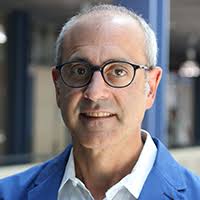
Which part of your day do you most look forward to?
My wife and I moved to London a year ago and found a lovely maisonette, and our balcony overlooks a verdant expanse of gardens and backyards between two long rows of Victorian homes from high above. The sun pours down all afternoon and the best time of the day is 6-7pm when neighbours are out, kids playing, 20-somethings Zooming, 40-somethings lounging about with cocktails, older folks wrapping up their outdoor projects for the day. It’s very sweet to be out there soaking it in, often with my mandolin, which (usually) enchants the toddler on the next veranda.
What have you found challenging during lockdown?
I work long hours and have quite enjoyed balancing the intensity of my job with the energy of life in London since moving here. I also like to mix time reading and writing in solitude with work that gets me personally engaged with colleagues and students. These forms of balance just are not possible in the same ways or to the same degree right now. My research similarly blends secluded reflection on political theory with fieldwork among precariously situated migrant workers. The pandemic has compelled me to write about new forms of precarity erupting all around us in relation to endemic social and political problems, but the writing feels unusually abstract at the moment. It is also difficult to process the cognitive and emotional dissonance between the relative stability I am fortunate to enjoy and the mass suffering that grips the world. I am able to work remotely from the safety of my home; share time with my wife and our 22-year-old daughter, who fled Brooklyn to shelter with us; face infection risks only when I venture to the grocery. Some things are hard. I am concerned about my mother’s health and isolation in lockdown – she’s in her eighties – and disappointed that our son’s long-awaited graduation had to be cancelled. But I write about meatpacking workers whom the US government has ordered to stay at their posts despite mass COVID-19 outbreaks in slaughterhouses, and many are dying. I write about day labourers who (like meatpackers) rarely have physically safe work even in “normal” times, whose jobs have evaporated, and who often belong to the homeless populations being ravaged by the disease.
How do you keep in touch with the LSE community?
I have been happily surprised with how satisfying my individual meetings and seminars with students have been on Zoom. No question, it isn’t the same as meeting in person on campus – the distance is real. Yet I feel that my students and I were able to shift modes fairly adroitly and make the most of our time together at the end of Lent Term and have continued to do so during “office hours” since. These things have generally worked out notwithstanding the reality that the pandemic, and the havoc and stress associated with it, have hit some students much harder than others. Some of my students seem to be getting on just fine, whether they are living on their own or with family right now. Others suddenly have to care for younger siblings, deal with internet connectivity issues, or are anxious about physician parents who work among the sick. As an educational leader, I have been inspired and impressed by my colleagues’ commitment to recognising that different people respond in different ways to hard times and to working methodically, patiently, and with perseverance to develop viable responses to the monumental challenges we confront. Zoom and Teams meetings are working much better than I would have expected for these deliberations too. Occasional social video-drinks with colleagues also help to keep things sane.
What do you miss most about being on campus?
Everything, except the CBG lifts. And the construction. I came to LSE after spending the first part of my career at a rural American liberal arts college. The switch to London is still new enough that I actually enjoy taking the tube at rush hour. Likewise, over the past year I have been getting a daily charge just by navigating our campus’s warren of narrow streets amid the dense jumble of LSE’s buildings. I sorely miss seeing colleagues and students in person, and the folks who make espresso in the CBG ground floor café.
Would you like to share some words of advice or your personal mantra that gets you through lockdown?
Keep walking. We are lucky to be able to walk for exercise and pleasure in London, and I find this an essential way to lay the work aside and be elsewhere than inside. My sister lives in Buenos Aires and she and her five-year-old are only allowed to go out to buy food and other necessary supplies (although it should be noted that all of Argentina has had fewer than 300 COVID-19 deaths). Appreciate the people around you. For me, it is a gift to have this unforeseen windfall of time with my wife, who is often up at the University of Birmingham where she is a faculty member, and my daughter, whom I’d resigned myself to seeing mostly on holidays. Keep Zooming/Skyping/etc. Family group calls on Sundays and daily calls with our son are the other very best parts of my weeks and days.
____________________________________________________________________________________________________________________
This post is opinion-based and does not reflect the views of the London School of Economics and Political Science or any of its constituent departments and divisions.
____________________________________________________________________________________________________________________
Contributions collated and compiled by David Blake-Faggiani, Chris Doughty, Francesca Humi, Lydia Halls, and Lee-Ann Sequeira


